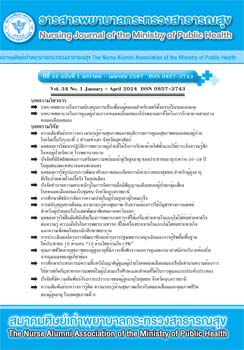Hopelessness Experience of Family Caregivers of Patients with Stroke
Main Article Content
Abstract
Caring for a stroke patient for a long time is burdensome, which can cause caregivers fatigue and stress. The aim of this descriptive qualitative study was to describe hopelessness experiences of family caregivers of the stroke patients in community. The participants were 10 family caregivers providing direct care for the stroke patients in community. Data were collected by in-depth interviews between September 2021 and April 2022. Data were analyzed by content analysis method. Five themes emerged from data analysis were as follows: 1) Perceptions of hopelessness for caring the stroke patients were tried, discouraged, self-blaming, and disappointed when the patients were not recovered, resulting in desperateness to continue caring for the patients. 2)All of caregivers had experiences to encounter hopelessness for caring the stroke patients at first year when the patients had worsen a symptom and readmission to a hospital, which caused more stress for caregivers. 3) Causes of hopelessness for caring the stroke patients were from the caregiver themselves, patients and family. 4) Hopelessness for caring the stroke patients had direct effects on the patients and caregivers. 5) Reconstruction of hope and ability to care for the patients rebounded by looking for assistance, motivation, empowerment, and learning disease progression. The results of this study disclose the hopelessness phenomenon, causes, effects, and how to deal with hopelessness of the family caregivers of the stroke patients. These findings may be useful for health personnel to understand and provide relevant support to the family caregivers of the stroke patients in community.
Article Details

This work is licensed under a Creative Commons Attribution-NonCommercial-NoDerivatives 4.0 International License.
บทความและรายงานวิจัยในวารสารพยาบาลกระทรวงสาธารณสุข เป็นความคิดเห็นของ ผู้เขียน มิใช่ของคณะผู้จัดทำ และมิใช่ความรับผิดชอบของสมาคมศิษย์เก่าพยาบาลกระทรวงสาธารณสุข ซึ่งสามารถนำไปอ้างอิงได้
References
Hirunkhro B. Care management model for elderly stroke patient at home. EAU Heritage Journal Science and Technology 2017;11(3):112-21.(in Thai)
Paksee N, Srivisai T, Khunkaew S. Preparation of family caregivers of patient with stroke on transitional care from hospital to home. Boromarajonani College of Nursing, Uttaradit Journal 2021;13(1):47-61. (in Thai)
Tong AU, Samartkit N. Influences of caregivers’ preparedness, caregivers’ burden and caregiver’ reward on adaptation of caregivers caring for patients with stroke. Journal of Nursing Division 2017;46(3):88-102.(in Thai)
Prombut P, Piaseu N, Sakulhongsopon S. Factors related to stress of family caregiver of patients with stroke at home. Ramathibodi Nursing Journal 2014;20(1):82-96.(in Thai).
Pinar G, Pinar T, Ayhan A. The strain and hopelessness in family caregivers of patients with gynecologic cancer receiving chemotherapy.International Journal of Hematology and Oncology 2012;22(3):170-80.
Pongsuwan C, Ruangroengkulrit P, Balthip K. The long-term management process of caregivers caring for stroke survivors in Muang district, Yala province. Nonthaburi: Health Systems Research Institute. 2019. (in Thai)
Aloba O, Ajao O, Alimi T, Esan O. Psychometric properties and correlates of the beck hopelessness scale in family caregivers of Nigerian patients with psychiatric disorders in Southwestern Nigeria. Journal of Neurosciences in Rural Practice 2016;7(1):18-25.
Liu RT, Kleiman EM, Nestor BA, Cheek SM. The hopelessness theory of depression: a quarter century in review. Clinical Psychology: Science and Practice 2015;22(4):345–365.
Lalitananpong D. Emergency psychiatry. Bangkok: Chulalongkorn University Printing House. 2018. (in Thai)
Yotthongdi N, Sunthornchaiya R. Factors related to hopelessness of elderly patients with depressive disorder and physical illness. Journal of Boromarajonani College of Nursing, Bangkok 2017;33(1): 29-39.(in Thai)
Chayawatto C. Depression in the caregivers of stroke patients. Region 4-5 Medical Journal 2016;35(1): 14-27.(in Thai).
Bannaasan B, Pothiban L. Hopelessness of cancer survivors. The Journal of Psychiatric Nursing and Mental Health 2018;32(2):1-12.(in Thai)
Department of Disease Control. Mortality rate of patients with ischemic stroke [internet]. 2020 [cited 20 May 2022]. Available from: http://healthkpi.moph. go.th /kpi2/kpi/index/. (in Thai)
Van Manen M. Researching lived experience: human science for an action sensitive pedagogy. London: Routledge. 1997.
Lincoin YS, Guba EG. Naturalistic inquiry. United States of America: Sage. 1985.
Yotthongdi N. Factors related to hopelessness of elderly patients with depressive disorder and physical illness [Master thesis]. Bangkok: Chulalongkorn University. 2015.(in Thai)
Karayagiz M, Gonca, Coskun C, Sibel. The family burdens and hopelessness of Turkish parents of adolescents with Intellectual disabilities. Rehabilitation Nursing 2018;43(6):351-62.
Melendez JC, Delhom I, Satorres E, Abella M, Real E. Hopelessness as a predictor of loneliness in older adults. Revista Espanola de Geriatria y Gerontologia 2022;57(2):85-9.
Serafini G, Lamis DA, Aguglia A, Amerio A, Nebbia J, Geoffroy PA, et al. Hopelessness and its correlates with clinical outcomes in an outpatient setting. Journal of affective disorders 2020;263(-): 472-9.
Kasemkitwattana S, Prison P. Chronic patients’ family caregivers: a risk group that must not be overlooked. Thai Journal of Nursing Council 2014;29(4):22-31.(in Thai)
Phimphanchaiyaboon L, Phasuk S, Angsirisak N, Boonlom N, Prakhinkit S. The relationship between social support and stress of caregivers caring for patients with schizophrenia. Journal of Health and Nursing Research 2021;37(2):263-73.(in Thai)
Dang Q, Zhang B, Nunez A. Factors associated with hopelessness and the role of social networks among Chinese older adults. Archives of Gerontology and Geriatrics 2021;92 (-):104261.
Dwyer ST, Moyle W, Zimmer GM, De LD. Suicidal ideation in family careers of people with dementia. Aging & mental health 2016;20(2):222-30.
Suksawat B, Hengudomsub P, Nabkasorn C. The effects of group cognitive behavioral modification program on hope and depression among community-dwelling older adults. The Journal of Faculty of Nursing Burapha University 2017;25(1):95-107. (in Thai)

